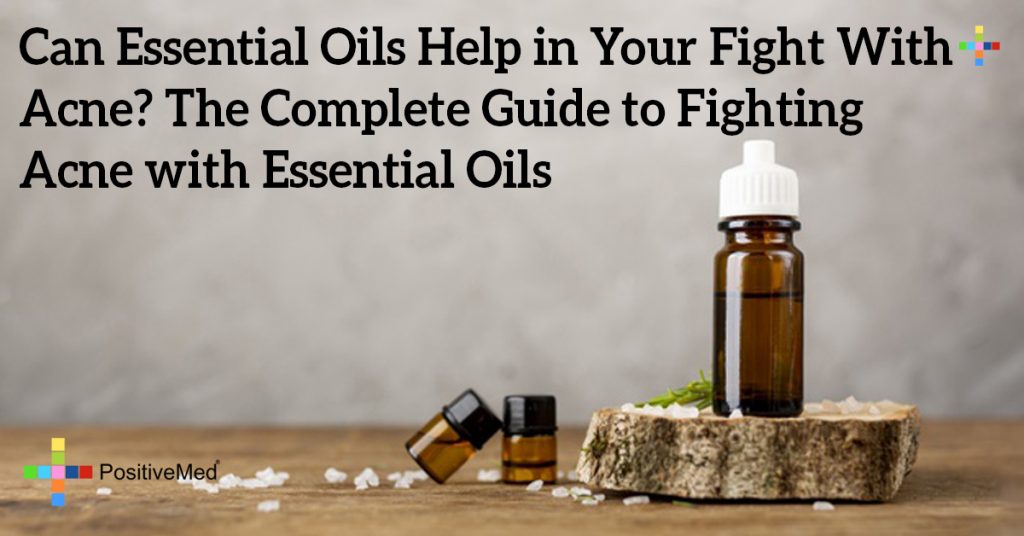
Can Essential Oils Help in Your Fight With Acne?
The Complete Guide to Fighting Acne with Essential Oils
Essential oils – the essences extracted from plants – have long been a staple of aromatherapy. Is it possible however that they also are helpful in your fight with acne?

Acne is a result of a hormonal imbalance and over productive sebaceous glands. When high levels of androgen are present in the bloodstream, it can send a message to your skin to begin producing more oil. This excess oil (also known as sebum) clogs your pores and allows acne-causing bacteria to flourish. Therefore, the only way to really stop the cycle of acne is to use something that can regulate the sebum production and return your sebaceous glands back to normal activity. Nevertheless, incorporating effective natural methods, which kill and remove bacteria, reduce inflammation and de-clog pores without injuring the skin is very important so using essential oils to supplement your acne treatment is definitely something to consider.
Essential oils are used to substitute the harsh chemical based cleansers, astringents or scrubs.
The Most Effective Oils to Fight Acne
Breakouts partially occur because acne-causing bacteria become trapped inside our pores. Certain essential oils have astringent properties, will reduce oiliness, diminish flushing (geranium oil) and like my favored rosemary oil extracted from rosemary leaves, will increase circulation and delivery of blood to the skin cells helping them to rebuild skin after pimples. Rosemary oil may also assist in lightening acne marks and delivers antioxidants needed for overall skin health. Clove oil that contains eugenol may help in fighting bacteria that may cause cystic acne but can also help to speed up healing of existing pimples.
The advantage to taking an essential oil-based approach to acne treatment is that many of these can be mixed and matched until they’re tailored to your own unique skincare needs.
Here is a list of the best acne-fighting essential oils and their major benefits:
• Geranium oil (reduces flushing)
• Rosemary Oil (increases circulation, rebuilds collagen, lightens acne marks, antioxidant)
• Lemon tree oil (astringent)
• Tea tree oil (antibacterial)
• Manuka oil (antibacterial)
• Bergamot Oil (antibacterial, astringent)
Please note the following instructions as well:
• You must use a carrier oil (see below) with an essential oil to dilute it.
• Don’t combine 2 or more essential oils in one mixture. Changing essential oils too often or combining them carry an additional risk of allergic reaction, unexpected sensitizing of the skin or even escalation of acne.
• Use essential oils as an addition to your regular acne skincare regimen
• You can use one soothing concoction in the morning (ex. rosemary oil and kukui oil) and one cleansing & astringent concoction at night (ex. bergamot oil and apricot kernel oil).
I personally favor bergamot oil as less harsh and more pleasant to use. It has both antibacterial and antiseptic qualities while also minimalizes the skin oiliness (works great on the t-zone) and therefore works both as an “assistant to treatment” and a beauty adjunct.
Whatever you use, however remember NEVER put an essential oil directly on your skin as they actually may cause severe irritation and allergic reaction. Always dilute them in a carrier oil such as:
• Sweet almond oil
• Apricot kernel oil
• Grapeseed oil
• Avocado oil
• Coconut oil
• Kukui oil
• Macadamia oil
Remember to avoid mineral oil. In choosing a carrier oil, I favor kukui oil (used in Hawaii as a beauty oil for centuries and loaded with anti-inflammatory properties) and apricot kernel oil for its moisturizing properties and light texture. Most of the carrier oils have their own beneficial properties such as Vitamin E, Vitamin A and antioxidants.
You might be surprised to learn just how little of an essential oil should be used when creating a mixture. Most experts recommend that essential oils comprise no more than 2% of your final concoction – which means you should use about 12 drops of essential oil for every ounce (6 tsp.) of carrier oil. However, if your skin is particularly sensitive, you may want to begin with as little as 1%, or 6 drops.
Try testing a patch of skin on your underarm (a sensitive part) first and if there is no reaction, you can apply with a soft washcloth.
Please note, do not drink these (or ANY) essential oils mixtures, thinking you could treat yourself from the inside out. Even some of the carrier oils such as avocado oil, coconut oil, macadamia oil or grapeseed oil are great for cooking or salads, but when mixed with essential oils they may become difficult to digest, cause cramps and diarrhea. The longer term effects are unknown as well, so better to be safe.
How to Choose the Right Essential Oil Brand
It is just as important to choose a quality essential oil – one that is effective and safe. I prefer going with a smaller grower who is as close to the production process as possible – you’re also supporting a small business owner. Here are some characteristics that you’ll want to look for in a company that sells essential oils:
• GC/MS tested
• Organic
• Grown in indigenous locations
• Doesn’t include anything additional like fillers or solvents
• Extraction should be under low pressure/temperature
• High quality and effectiveness should go without saying!
• Stellar education/customer service
Possible Problems with Essential Oils for Acne Treatment
If you’ve been dealing with acne for any length of time, then you’re already familiar with the burdens of sensitive skin. Unfortunately, when used carelessly, essential oils can make these skin sensitivity problems even worse.
As we stated above since essential oils contain highly concentrated plant extracts, they’re simply too powerful to be applied undiluted to the skin – and this is especially true for oils that are highly acidic or astringent, such as lemon tree oil or bergamot oil. When exposed to substances such as this, it’s not uncommon to experience painful rashes, itching, and burning, even blisters.
What is best for you?
While you may find success in helping to heal current breakouts with essential oils, it’s important to remember that they do not address the primary causes of acne. Because of this, it’s best to think of them as a means of “damage control” and not a permanent solution to your acne problems.
In order to truly be rid of your breakouts, you must focus on the unseen, internal origins of acne. For many people, the trouble starts with their hormones. Therefore only products that address this problem are an efficient way to treat acne and prevent the new ones form coming. It’s also important to use something that does not directly affect hormone levels (playing with hormones may be very tricky) and instead prevents androgens from sending its signals to your skin.
What has your experience been with essential oils? Good? Bad? Tell us in the comments.
Want to start treating the primary causes of acne so that your problems don’t persist? Learn more now.
With a promise of clear skin, Dr. A





